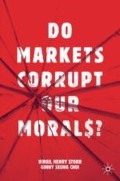Abstract
Most scholars accept that people are materially better off in market societies, and that people are materially worse off in nonmarket societies. However, there is a debate among the critics, defenders, and students of commercial life concerning whether or not the wealth that societies gain by embracing markets comes at a high moral cost. This chapter argues that it is important to answer the question of whether or not engaging in market activities is morally corrupting. As such, we ask and answer the question: Do markets corrupt our morals? Are markets moral spaces that depend on and cultivate our morality or are markets immoral spaces where vice thrives and is encouraged? Is virtue endogenous to markets?
Access this chapter
Tax calculation will be finalised at checkout
Purchases are for personal use only
Notes
- 1.
Notice that this echoes Aquinas’ concern about a “just price.”
- 2.
It might be argued that the more important worry relates to the quality of life of the poorest in these countries, that the gap between the rich and the poor in a particular country is an irrelevant consideration, and that mobility rather than inequality should be the principal consideration. Additionally, as we discuss in Chap. 4, economic inequality is more of an issue in nonmarket societies. Still, it would be wrong to dismiss economic inequality as a legitimate concern or to say that economic inequality is not a phenomenon that we observe in market societies.
- 3.
See Appendix for the list of market and nonmarket societies.
- 4.
This, of course, will not be fully satisfying to anyone who worries that markets are morally corrupting. A critic of markets concerned about the potential of moral corruption as a result of market activity could always complain (a) that they are not committed to the view that nonmarket societies are less morally corrupting than market societies, or (b) that our approach does not account for all of the complexity involved in linking market activity to moral outcomes. However, the arguments and evidence that we offer are reasons to be skeptical of the claim that markets are morally corrupting. At the very least, we advance a response to the question, “Do markets corrupt our morals?,” that directly engages that question. If we inspire others to look for more compelling ways to assess whether or not market activity is morally corrupting, we would have surpassed our ambition.
- 5.
Munger and Russell (2018) asked a similar question about profit seekers.
Bibliography
Anderson, E. 1995. Feminist Epistemology: An Interpretation and a Defense. Hypatia 10 (3): 50–84.
Aquinas, T. [1485] 1918. Summa Theologica. Trans. English Dominican Province. London: Burns, Oates & Washbourne.
Aristotle. [350 BC] 1984, 2013. Politics. Trans. Carnes Lord. Chicago/London: University of Chicago Press.
Berggren, N. 1999. Economic Freedom and Equality: Friends or Foes? Public Choice 100 (3–4): 203–223.
Bowles, S. 2016. The Moral Economy: Why Good Incentives Are No Substitute for Good Citizen. New Haven: Yale University Press.
Central Intelligence Agency. 2018. The World Factbook 2018. https://www.cia.gov/library/publications/the-world-factbook/index.html
Falk, A., and N. Szech. 2013. Morals and Markets. Science 340 (6133): 707–711.
Human Rights Watch. 2015. World Report 2015: North Korea: Events of 2014. New York: Human Rights Watch. https://www.hrw.org/world-report/2015/country-chapters/north-korea
Human Rights Watch. 2017. World Report 2017: Events of 2016. New York: Human Rights Watch. https://www.hrw.org/sites/default/files/world_report_download/wr2017-web.pdf
Lavoie, D., and E. Chamlee-Wright. 2000. Culture and Enterprise: The Development, Representation and Morality of Business. London/New York: Routledge.
MacIntyre, A. 1981. After Virtue: A Study in Moral Theory. Notre Dame: University of Notre Dame Press.
———. 1999. Dependent Rational Animals: Why Human Beings Need the Virtues. Chicago: Open Court Publishing.
Mandeville, B. [1714, 1732] 1988. The Fable of the Bees or Private Vices, Publick Benefits. With Commentary by F.B. Kaye. Indianapolis: Liberty Fund.
Marx, K. [1821] 1994. Karl Marx: Selected Writings, ed. L.H. Simon. Indianapolis: Hackett Publishing.
McCloskey, D.N. 2006. The Bourgeois Virtues: Ethics for an Age of Commerce. Chicago: University of Chicago Press.
———. 2010. Bourgeois Dignity: Why Economics Can’t Explain The Modern World. Chicago: University of Chicago Press.
———. 2016. Bourgeois Equality: How Ideas, Not Capital or Institutions, Enriched the World. Chicago: University of Chicago Press.
Munger, M.C., and D.C. Russell. 2018. Can Profit Seekers Be Virtuous? In The Routledge Companion to Business Ethics, ed. E. Heath, B. Kaldis, and A. Marcoux, 113–130. London/New York: Routledge.
Roth, A.E. 2007. Repugnance as a Constraint on Markets. Journal of Economic Perspectives 21 (3): 37–58.
Sandel, M.J. 2012. What Money Can’t Buy: The Moral Limits of Markets. London: Macmillan.
Schwab, K., X. Sala-Martin, and R. Samans. 2017. The Global Competitiveness Report 2017–2018. Geneva: World Economic Forum.
Scully, G.W. 2002. Economic Freedom, Government Policy and the Trade-Off Between Equity and Economic Growth. Public Choice 113 (1–2): 77–96.
Shleifer, A. 2004. Does Competition Destroy Ethical Behavior? American Economic Review 94 (2): 414–418.
Smith, A. [1776] 1981. An Inquiry into the Nature and Causes of the Wealth of Nations. Indianapolis: Liberty Fund.
———. [1759] 1982. The Theory of Moral Sentiments. Indianapolis: Liberty Fund.
Stewart, D. [1795] 1829. The Works of Dugald Stewart. Vol. 7. Account of the Life and Writings of Adam Smith. Cambridge: Hilliard and Brown.
Storr, V.H. 2008. The Market as a Social Space: On the Meaningful Extraeconomic Conversations That Can Occur in Markets. Review of Austrian Economics 2 (2–3): 135–150.
The World Bank. 2016. World Bank Open Data. https://data.worldbank.org/. Accessed 15 Mar 2016
Author information
Authors and Affiliations
Rights and permissions
Copyright information
© 2019 The Author(s)
About this chapter
Cite this chapter
Storr, V.H., Choi, G.S. (2019). Can Markets Be Moral?. In: Do Markets Corrupt Our Morals?. Palgrave Macmillan, Cham. https://doi.org/10.1007/978-3-030-18416-2_1
Download citation
DOI: https://doi.org/10.1007/978-3-030-18416-2_1
Published:
Publisher Name: Palgrave Macmillan, Cham
Print ISBN: 978-3-030-18415-5
Online ISBN: 978-3-030-18416-2
eBook Packages: Economics and FinanceEconomics and Finance (R0)

